A town in South Africa reflects nation’s angst, 25 years after the end of apartheid
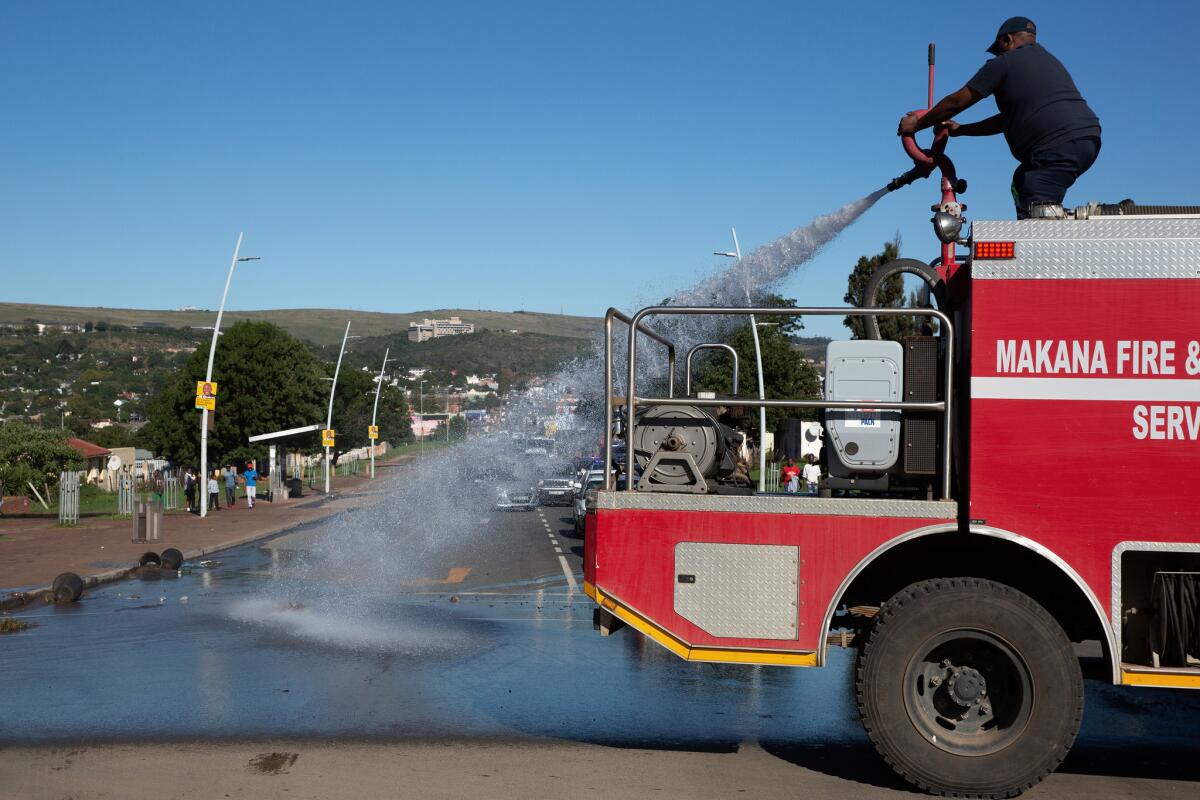
- Share via
Reporting from Makhanda, South Africa — It is just after 9:30 a.m., and a throng of onlookers stands along Dr. Jacob Zuma Drive in Makhanda, a small city in southern South Africa, holding their shirts over their noses.
They watch as a firefighter sprays mounds of human excrement out of the intersection, after furious residents emptied their bucket toilets into the road where President Cyril Ramaphosa was expected to drive by later that morning.
It is April 27 — Freedom Day in South Africa — the 25th anniversary of the country’s first free, multiracial election. It is also less than two weeks before millions of South Africans will go to the polls in national elections on May 8, with Ramaphosa touring the country to make the case that his ruling African National Congress, which fought for the end of apartheid and has enjoyed uninterrupted power ever since, still deserves their vote.
“When elections are near, they promise everything,” Sayda Cetu, a 30-year-old resident, said earlier in the morning as a few dozen of his neighbors sang in protest near a burning tire.
It’s not just that people in this part of Makhanda are still using the unhygienic and humiliating bucket toilet system. Garbage is piling up. The roads are full of potholes. The city water is dirty. “Our municipality is failing us,” Cetu said. “The ANC is failing us.”
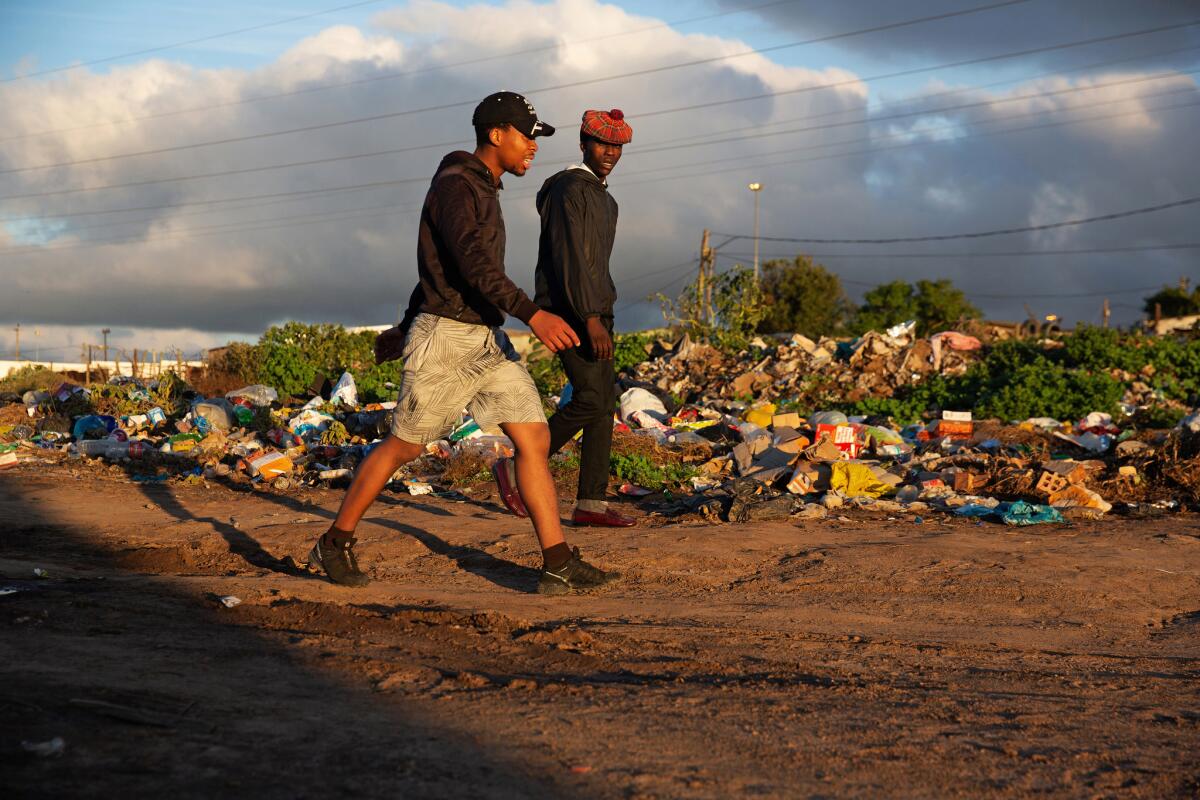
Many think of Makhanda, formerly called Grahamstown, as a tidy, picturesque burg that is home to prestigious Rhodes University, some of the country’s top private schools and the National Arts Festival. But not everyone has such cozy memories. Black South Africans lived in segregated poverty during apartheid, as they did everywhere. Today many residents are still direly poor.
But everyone seems to agree on one thing: The city has gone downhill fast.
Makhanda’s decline mirrors the mounting challenges a quarter of a century into South Africa’s young democracy. Unemployment is rampant, the gap between rich and poor is vast, and the government’s inability to reliably deliver on basic needs such as water, sanitation and housing disproportionately affects the poorest.
“Grahamstown is South Africa in a microcosm,” said Richard Gaybba, who coordinates the Grahamstown Business Forum. Makhanda was renamed last year in honor of a warrior from the Xhosa tribe who led an attack on British colonizers here in 1819. “We’ve got major problems everywhere,” Gaybba added.
Life for millions of South Africans has drastically improved in the 25 years since Nelson Mandela became the country’s first democratically elected president, bringing a long-overdue end to apartheid’s state-sponsored racism and subjugation. Black South Africans became citizens of their own country. Millions of families have received government housing, welfare grants and free education. The country’s homicide rate has nearly been halved.
“We must reflect on how far we have traveled,” Ramaphosa said during his speech on Freedom Day a couple of miles up the road from where protesters emptied their toilets. “Where this country’s majority once lived lives of subjugation, today all South Africans enjoy equal rights before the law.”
But, he added, “too many of our people still live in poverty, too many are unemployed, too many are homeless, too many do not have the basic necessities of life.… We cannot be a nation of free people when so many still live in want.”
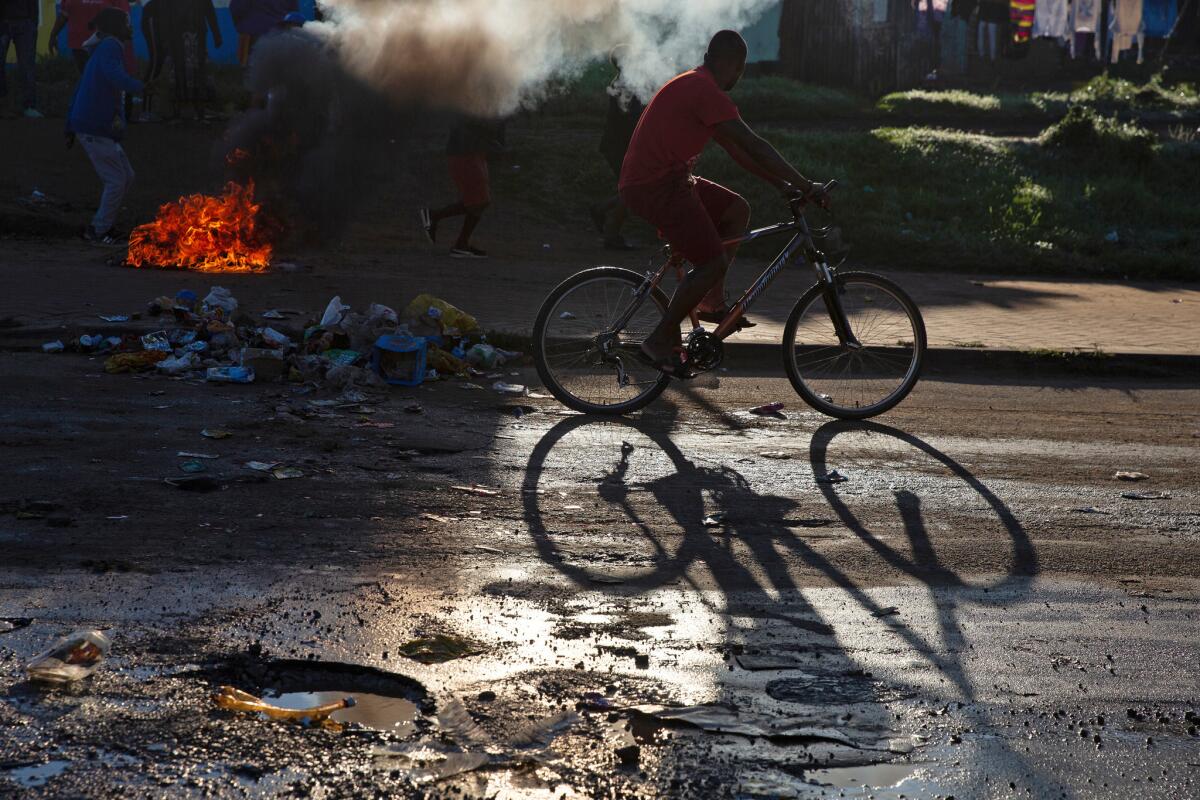
Many would agree. Despite so many gains, most South Africans think the country is moving in the wrong direction, according to polling group Afrobarometer. That is due in no small part to the tenure of former President Jacob Zuma, whose nine years in office were characterized by almost constant scandal and state corruption whose depth is still just coming to light.
The ANC’s popularity plummeted under Zuma. The party saw its worst-ever electoral performance in municipal elections in 2016, losing control of the key cities of Pretoria and Johannesburg. In February 2018, the party forced Zuma to step down, and Ramaphosa took over, pledging to root out corruption and get the country back on track.
At last count, the party of Nelson Mandela still had a comfortable national majority, sweeping up 62.1% of the country’s votes in 2014’s elections. By comparison, the liberal Democratic Alliance, the country’s largest opposition, won 22.2% of the votes, and the radical left Economic Freedom Fighters won just 6.3%.
It would be a major upset for the ANC’s national support to slip below 50% for the first time — though some recent polls have shown it may be close — forcing the party into what would potentially be a very unstable coalition.
On Freedom Day, sitting in rows of white plastic chairs beneath a vast marquee on a soccer field in Makhanda, ANC supporters leaped to their feet to cheer the president as he walked to the podium to deliver his speech. “Rama! Rama! Rama!” they chanted.
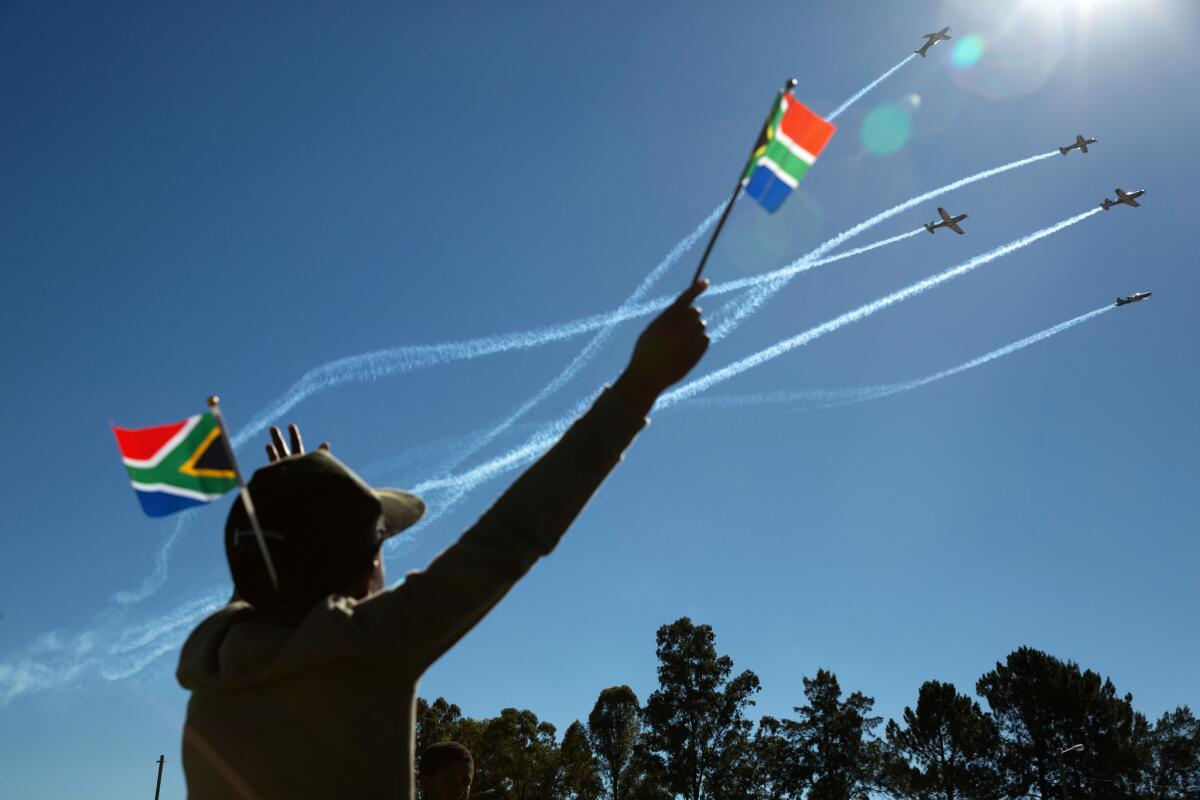
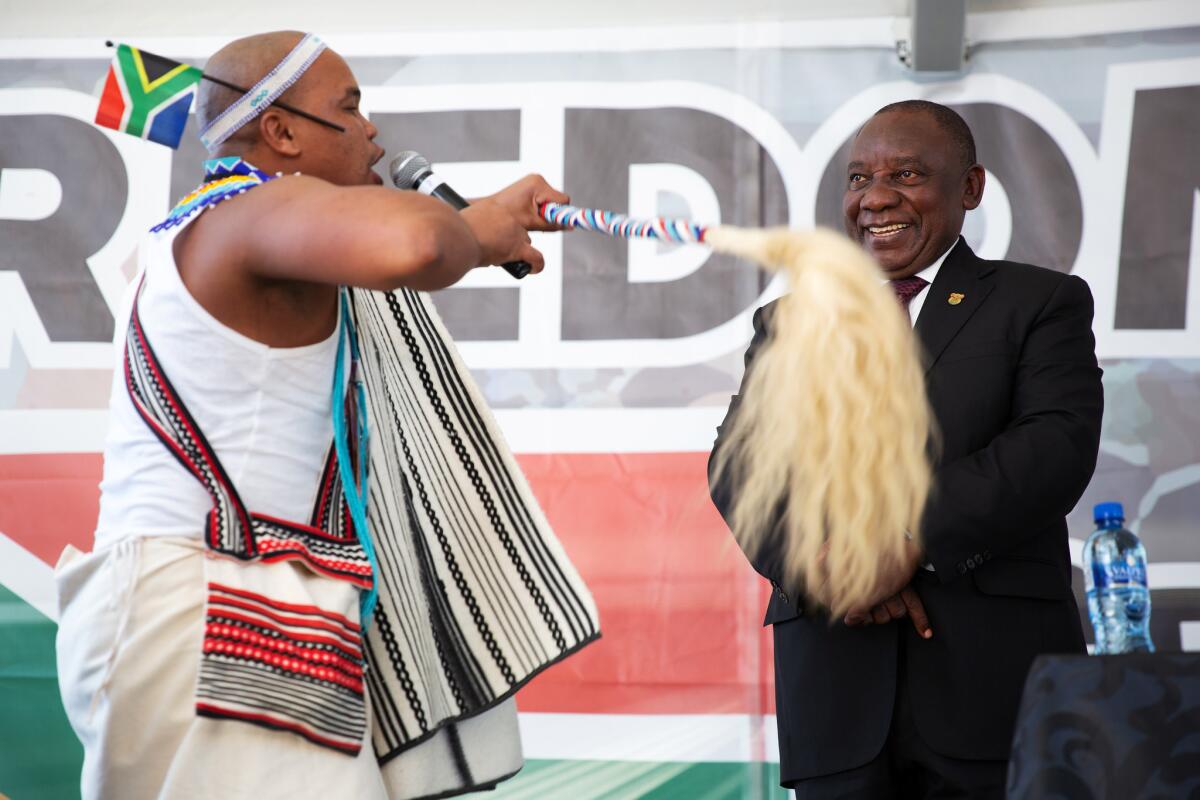
Lindeka April, a 27-year-old early childhood development specialist wearing an ANC T-shirt and flag draped around her shoulders, drove two hours to come to the Freedom Day celebration and see the president. She believes she owes the party her support after her parents fought so hard with it for democracy in South Africa.
“There’s room for progress, but we have to take it step by step,” April said. “They’re still doing a good job.”
Others aren’t so sure. One man stands at the rear of the tent, his arms folded skeptically across his chest.
“Since 1994, we were promised our lives were going to be better,” said Mhamha, an assistant nurse in a government hospital in Makhanda, who declined to give his last name so he could speak freely. “2004 it was the same song. 2009 it was the same song. It’s 2019 now.”
He said he’s always voted for the ANC, but this year maybe not. “I’m not really sure now. I’m not happy,” he said.
During a drive through Makhanda’s hilly neighborhoods, it’s not hard to see why residents are fed up. Constellations of potholes dot the roads in both upscale parts of town and its poor communities. Even after streets were tidied up ahead of the presidential visit, clumps of garbage are still strewn around town.
The city’s sewage infrastructure has not been maintained to keep up with a growing population, experts say. Raw sewage flows openly in some of the town’s waterways and even pools up in some homes. “The sewage treatment is operating at 100% and it’s on the verge of collapse,” said Matthew Weaver, a postdoctoral fellow at Rhodes University’s Institute for Water Research. “It’s like a ticking time bomb.”
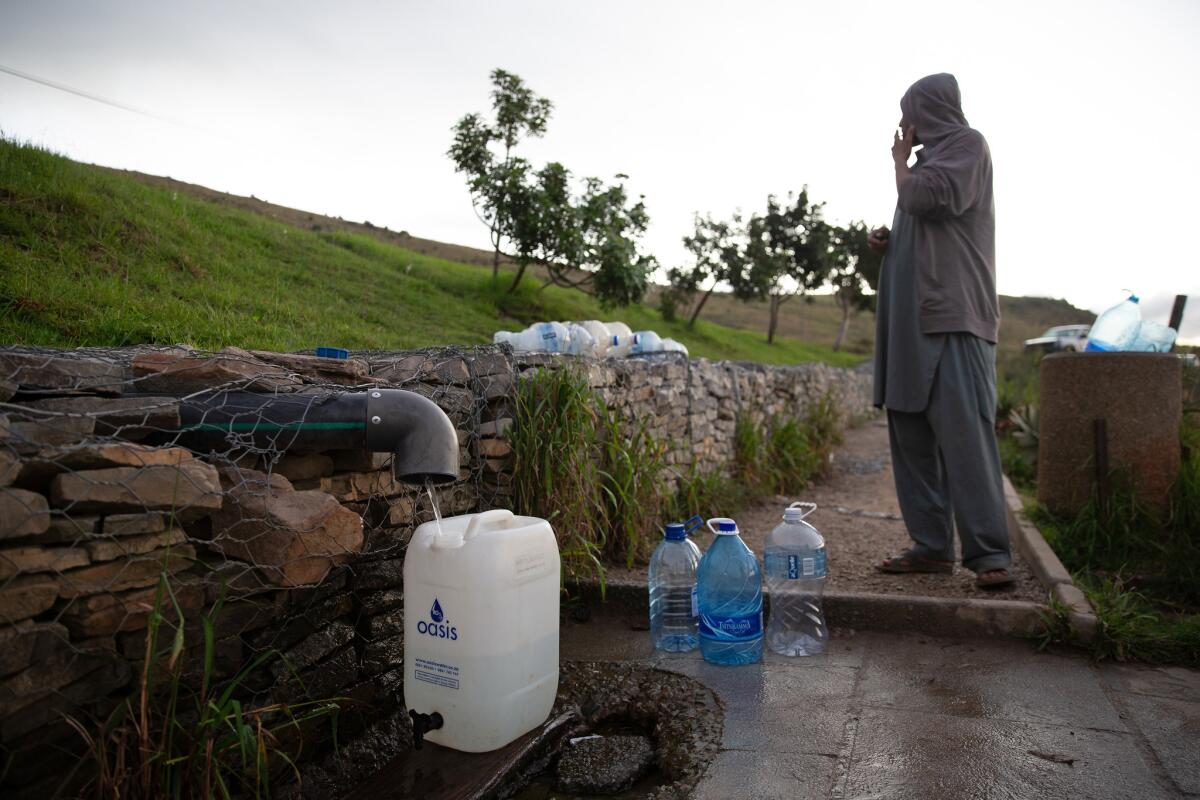
On top of it all, the region has also been in the grip of a crippling drought, with dams that supply part of the town’s water running empty or low, and the city’s water treatment plant struggling to clean enough water to supply residents’ needs. People all over the city complain the water they do get looks dirty, and at times makes them feel sick.
A charity called Gift of the Givers, which has drilled boreholes on the outskirts of town, is now independently extracting and treating water that it distributes to locations around the city six or seven times a day, its organizers say.
It’s hard to pinpoint when things got so bad, said longtime resident Ron Weissenberg, who coordinates a citizens group called Makana Revive that fixes potholes, picks up trash and replaces broken lightbulbs in street lamps around town. “It’s been a slow, progressive deterioration.”
Weissenberg and other critics of the city say fiscal mismanagement, corruption and irregularities in awarding tenders for work contracts have all contributed to its problems today.
In February, the Unemployed People’s Movement, another citizens group based in Makhanda, filed a motion to a provincial high court to have the municipality dissolved for failing to provide services or a healthy, safe living environment for residents. The matter is still before the court.
“The municipality has sunk into a black hole,” said Ayanda Kota, the group’s leader. “The problem is not in one individual. The problem is the culture within the municipality — the culture of patronage, the culture of corruption, the culture of greed.”
The ANC is not ignorant of the problem. The party’s support has waned locally in recent years, winning 73.7% of the votes in 2011 local elections, and only 62.4% in 2016, while the opposition Democratic Alliance has gained ground. In December, the party appointed a new mayor to take over, who had, incidentally, also been the municipality’s first black mayor after the historic 1994 polls.
“It would be a lie to say the city is not in a bad state,” Mayor Mzukisi Mpahlwa said in a phone interview last week. “There’s been a lot of unhappiness, or at least distrust among residents over the poor service they have been getting. What I’ve tried to do coming in is bring back that trust, to say that we can sort things out.”
He said the thrust of the problem is that the city has not been able to collect enough revenue to pay off the money it owes to agencies such as the national electricity provider and the provincial water utility. The city owes about $11 million, which means that there is not enough money to fix things like pockmarked roads and old leaky pipes.
Even if he does place part of the blame on residents who don’t pay their taxes and water bills, Mpahlwa agrees with the critics that poor oversight of the city’s finances in the past are at least partly responsible for the current state of affairs.
“If you don’t have proper governance, you’re bound to lose money from abuse by staff and everybody else,” Mpahlwa said. “We have to change that culture. You have to put in controls.”
It’s the kind of introspective tone that Ramaphosa has introduced to the ruling party in the last year, and if the ANC prevails again this month, it may offer some encouraging signs of the way the next ANC government might operate.
But Ramaphosa will need a firm mandate. As the president wades deeper into trying to clean up the party after Zuma’s exit, tensions between supporters of the two leaders have also intensified, raising fears that even with the best intentions, Ramaphosa’s efforts to reform might be undermined if the ANC squeaks in with a weak majority.
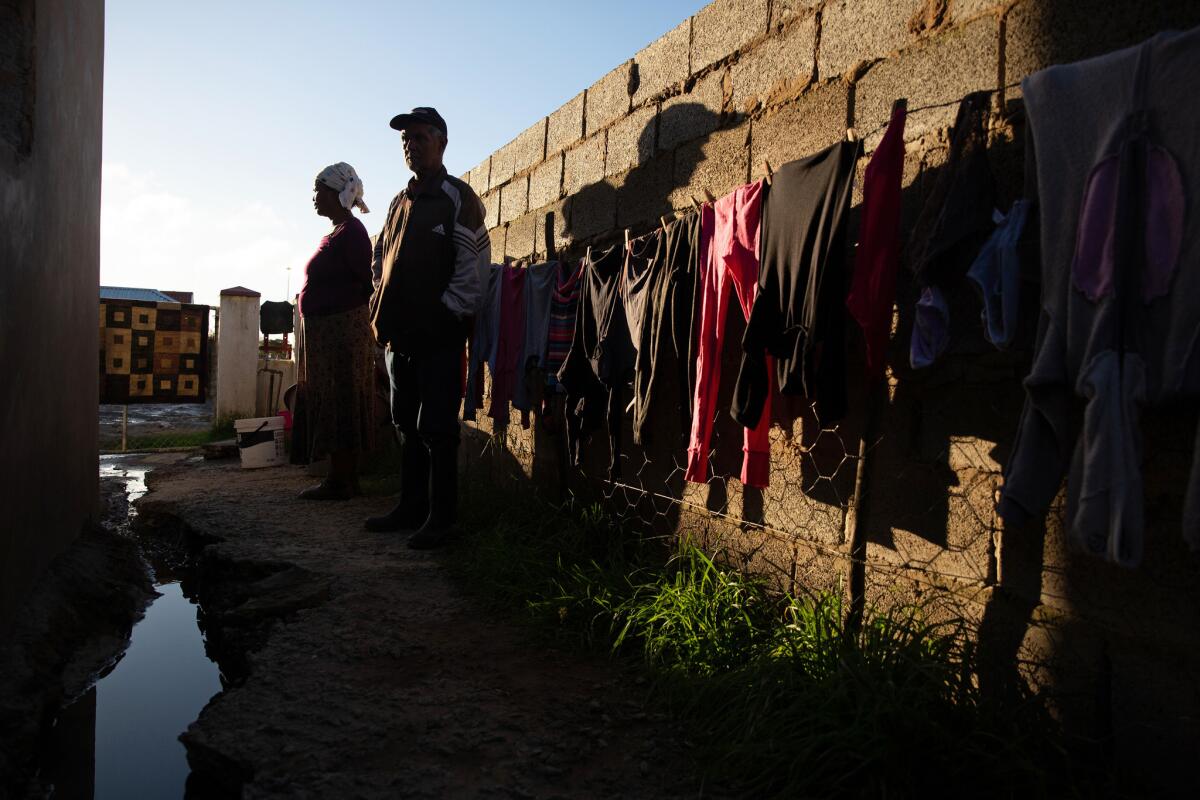
In places like Makhanda, the party’s attempts to convince voters it is in the midst of a renewal may be too late, even for lifelong supporters.
In a tract of low-incoming houses built in the late 1990s, Ntombizonke Maguga, 58, looks down at the raw sewage that has been pooling in her yard since last year, when a pipe broke in the neighborhood. The city has yet to fix it.
When her neighbors flush their toilets, refuse seeps up from the ground into the family’s bedrooms, leaving a watermark along the walls. Each morning, a family member sweeps the solid waste out of their home and into the street. Everyone in the household, including her 5-year-old grandchild, has been sick since it started.
“I used to vote for the ANC, but now—,” Maguga trails off, gesturing toward the sewage filling her home. “How can we vote in these conditions?”
Mahr is a special correspondent.
More to Read
Sign up for Essential California
The most important California stories and recommendations in your inbox every morning.
You may occasionally receive promotional content from the Los Angeles Times.













